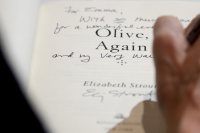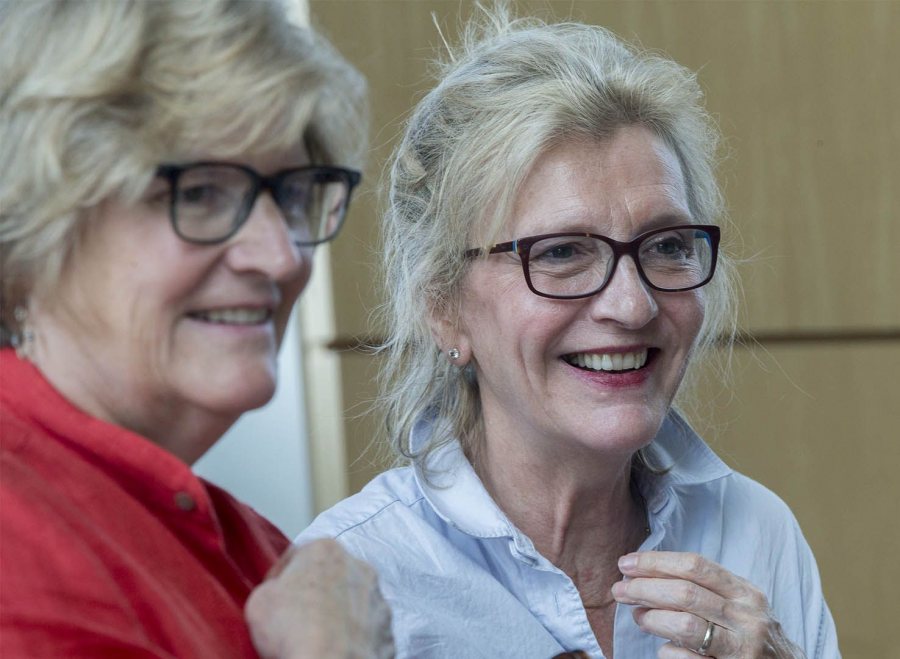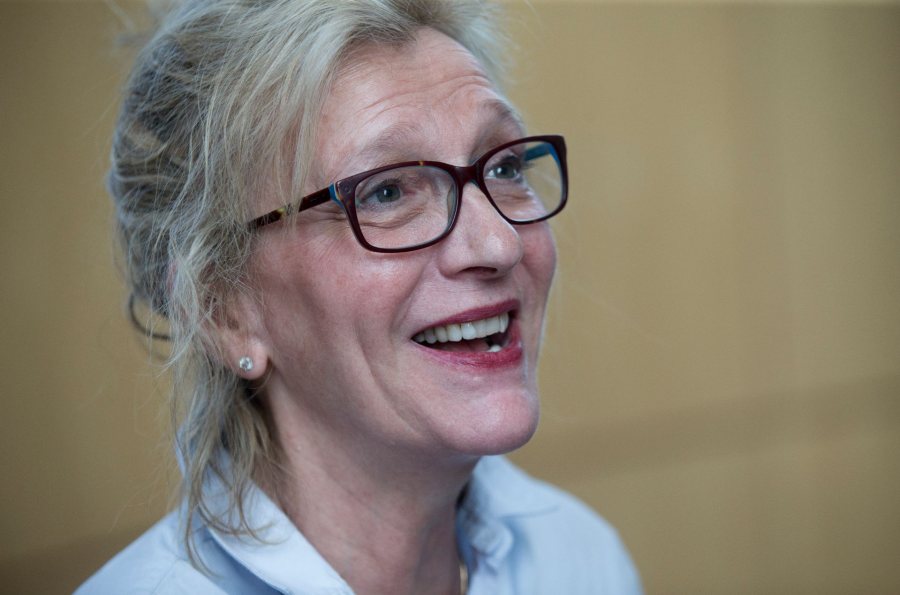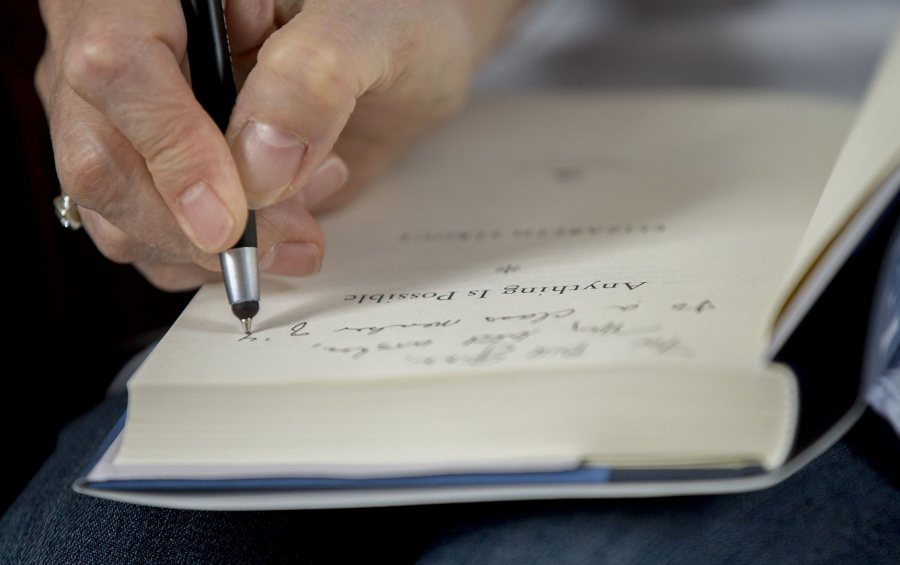
The big Reunion crowd who heard Pulitzer Prize–winning author Elizabeth Strout ’77 interviewed by President Clayton Spencer on June 10 was a Strout-savvy group.
As Spencer welcomed the gathering to the Fireplace Lounge of Commons, she asked how many had read one of the novelist’s books. Nearly every hand shot up. “Great, then we’re all speaking the same language,” Spencer said.
For those not yet fluent with Strout, it’s helpful to know something about her approach to writing before we begin this Spencer–Strout Q&A.
While her novels have the usual beginnings, middles, and endings, Strout does not create her works in that linear way. Instead, writing by hand, she fills sheets of paper with various scenes — moments, dialogue, vignettes — as they come to her.
Those sheets end up all over her large kitchen table. “I am a very messy worker,” she wrote in an essay for The Guardian last March. “I push these scenes around our table…and over time I realize which scenes are connected.”

President Spencer and Elizabeth Strout ’77 talk with audience members after their interview.(Phyllis Graber Jensen/Bates College)
Strout and her husband, Jim Tierney (a former Maine attorney general), split their time between New York City and Brunswick. The novelist was on campus for her 40th Reunion.
The characters in Anything Is Possible are connected to the characters in My Name Is Lucy Barton. Did you know as you were writing Lucy Barton that this was lurking in the wings?
Yes. As I was hearing and writing the conversations that Lucy Barton and her mother were having in the hospital, I would think about [the character of] Kathie Nicely. “She came to a bad end….But what did happen to Kathie Nicely?”
Then I would move over and write scenes about what Kathie Nicely ended up becoming. Then I would write different scenes about what happened to Mississippi Mary. So when I was done with Lucy Barton, I realized that I almost had another book.
There are many parts of this book where the scenes are just exquisitely drawn. You write this about Kathie Nicely’s daughter Patty: “She parked, checked her lipstick in the rear-view mirror, gave her hair a bounce with her hand, and then heaved herself from the car.”
I can’t always remember writing a scene — I just write all the time, and a lot of it gets thrown away. But I do remember writing that particular scene, and I think I initially wrote only that “She heaved herself from the car.”
Then I went back and thought, “No, no, no. This is Patty Nicely. Let’s think about this. Let’s clarify this. Let’s really get in there and be Patty. She’s going to check her lipstick. She’s going to give her hair a little bounce.” That was a rewrite.
As a writer, it seems you’re either this authoritative narrator, or the characters and their conversations are carrying the action forward. You’re never in between. How do you think about that?
I don’t think that I do think about it. At this point in my writing career, I have settled into a situation where I can write scenes. I always write by scenes, and I never write anything from beginning to end.
I don’t write a story from beginning to end. I don’t write a book from beginning to end. And I almost don’t write a scene from beginning to end. But, I will sit and start a scene, or a piece of a scene. I’ve learned how to do that, so that it will have a heartbeat to it.
At Bates, were you a theater major involved in English? Or an English major involved in theater?
I was a theater major who switched to English in the last year — because I realized that I could read more if I was an English major.
Is there any line we can draw from your theater experience here to how you write about scenes?
I just loved theater, and I still love theater. The classes I took with [Dana Professor of Theater] Marty Andrucki were wonderful. I loved those classes: Tennessee Williams, Clifford Odets, Eugene O’Neill. I would read those plays with so much interest. My ear might have been beginning training itself for a certain kind of dialogue, or certain use of dialogue.
What did your English classes contribute to this mix?
In my freshman year, I was just 17 years old. I never graduated from high school because I didn’t like high school, so I left. And I got into Bates. I never figured out how I go into this place, but I did and I am enormously grateful for that.

“I am really interested in time and place,” Strout tells her audience. “We all come from a place. And we all come from a certain time in history. And those two factors determine much of what happens to us.” (Phyllis Graber Jensen/Bates College)
My freshman year, I had Jim Hepburn, chair of the English department, for a class on short stories. I read Winesburg, Ohio, by Sherwood Anderson. And I could not believe that such a thing could be done with human language.
Jim Hepburn saw me as a writer, which was so important.
Even in that first semester?
Yes. He once gave me a B on a term paper, and I went to him and said, “Why didn’t I get an A?” He said, “You know, I don’t think I want to bother teaching you how to write term papers. I don’t think it would be good for you. So, every time there’s a term paper due, give me a short story. It will be our little secret.”
Really?
Really. And I took every class I could with him.
Your books are often about the leavers and the stayers, and there’s not much in between. In this book, there’s a category of leavers that seem especially complicated: mothers who leave.
Yes, in this book there are a lot of mothers who leave.
I am really interested in time and place. We all come from a place. And we all come from a certain time in history. And those two factors determine much of what happens to us.
This book is about women for whom, in that time and in that place, it was unusual to leave. Mississippi Mary leaves after many, many years, but in her generation it was still not something that women did. Kathie Nicely, if she had waited 20 years, would have been fine, but in that time in history, you just didn’t leave your husband. That was what I was interested in exploring in this book.
Have you thought about a more permissive, contemporary structure regarding staying and leaving?
Not yet.
Where do you get your character names?
Oh, the names. They are so fun — and very, very important. If they are not the right names, the story won’t work. I realized that way back with Amy and Isabelle.
Many of the names are from my family. I had a great aunt Olive, and the name Burgess is a family name [The Burgess Boys was her fourth novel]. A Kitteridge was married to a family member. So there are lots of names to mix and match. Otherwise, the names just come to me: “That’s right, that’s what she is. Let’s call her Patty. That’s perfect.”
You mention time and place. I’m curious what got you from a kind of romantic Maine with a dark side to the Amgash, Ill., of My Name Is Lucy Barton and Anything Is Possible.
It was freeing to write about the Midwest after writing about Maine, but it’s a similar cultural section of society that I’m writing about. When I was just playing around with scenes for My Name Is Lucy Barton — writing scenes, messing them around on my table — I wasn’t sure that I wanted to write the book. I wasn’t sure if I was going to write the book.
Then, as I realized that her mother had never been on a plane before, I thought, “Oh.” And then it just came to me: She comes from the sky. I saw sky, tons of sky, all around, the only kind that you can get in the Midwest. Then I saw this very tiny house, surrounded with sky.

Audience members react as President Spencer interviews Elizabeth Strout ’77. (Phyllis Graber Jensen/Bates College)
Once I made that decision, my husband and I made a few trips out there to make sure, for example, that I had the soybeans at the right height at that particular time of year. And we went out in November and had Thanksgiving at the Congregational Church just the way Lucy Barton’s family does.
Do you consider yourself a visual person? And is being visual necessary to being a good fiction writer?
I can only speak for myself, but I do see a lot. It is important for me. And it’s important to hear.
How do these novels come to you? You’ve said that Olive Kitteridge came to you.
Yeah, she just showed up.
Can you describe that?
I was unloading the dishwasher, or loading it — something with that dishwasher. And I saw this woman standing by a picnic table. And we’ve never had a picnic table in our family. But there she was, standing by the picnic table. And I could hear her, inside her head, thinking, “It’s high time everybody left.” And I thought, “Oh, I better get that down right away.” And I did. And that was Olive.
What’s the process by which you were led to unpack all the threads of Olive for the book?
Olive shows up, and I realize right away that this will be a book of stories about Olive. I understood what the form was going to be, and that’s important. Then I begin to understand right away that Olive will be too much to take on every page. The reader will need a break. I’ll need a break.
I’m so interested in different points of view, and that’s fun to do in a small town. I just love how, in a small town, we think we know someone, but we only know them this way, and someone else knows them that way. That was interesting to me, initially, as a way to give readers a break. But then as I made these characters I realized that they are living people who happen to know Olive in their own way.
How is what you’re doing in Anything Is Possible different or the same from Olive Kitteridge?
It’s almost an inverse. The Lucy Barton who connects these characters isn’t really present except for one story. She’s the thread — that connection and how they overlap — but there’s no “Olive force.”
Coming out of the unlikely mouth of Vicky, Lucy’s sister, in this book is the sarcastic reference to the “truthful sentence.” Lucy Barton talks about that also. It seems that you are on an inexorable quest for the truthful sentence.
It is essential, and I’ve always understood it to be essential. For years I kept thinking, “What is a truthful sentence?” I was trying to write as truthfully as possible but it was not sounding truthful.
It took years — and years and years — of practice and rewriting to know that this is a truthful sentence and that is a truthful sentence — to understand it intuitively.
Is a truthful sentence saying exactly what you mean? Or does it mean saying exactly what the character means to say?
The whole thing. It’s hard to describe what a truthful sentence is; it’s a very awkward thing to discuss. But it has to have all those things in it, and it has to be as direct…as…possible.

“I think I was born with intuition,” Elizabeth Strout ’77 said. “I could understand things, like about the human heart, from a very young age.” (Phyllis Graber Jensen/Bates College)
Your writing has the precision of an X-Acto knife. When we read a scene, are we reading the 23rd written draft? Or do your draft 22 times in your head and put it on paper once?
It’s something in between, and that’s because I write in patches. Some of those patches come out like the scene of Patty heaving herself from the car. Then there are other scenes that I will rewrite a lot more. Then there are some scenes at this point that come out almost directly.
“In my head, it’s like I have a bolt of material unfolded on my table, and on it I can see a constellation.”
Because I do write in a such a messy way, the problem is getting all the scenes to connect. It’s like, “Hmm, OK, I’ve got all these things that are sort of truthful, now what am I going to do?” I have to make sure I can get them together to present to the reader. But that’s a separate section of writing.
You make the reader your co-conspirator in actually knowing more than the characters. So when Angelina is visiting her mother, Mary, in Italy, she says, “You want to hear a little gossip?” You almost create an omniscient reader.
That was fun having them gossip.
In my head, it’s like I have a bolt of material unfolded on my table, and on it I can see a constellation. There’s Charlie. There’s Patty. There’s Mary. I know that they will all connect, so when something comes up — like when Angelina says to Mary, “You want to hear some gossip?” — it’s perfect. There we go. It ties it in.
Do you have a daily routine?
I’ve always been able to write anywhere, which is helpful. My first choice is to have breakfast and get my husband out of the apartment. And then I work for three or four hours and put lunch off as long as possible. That’s my favorite way to work.
Do you go back to the writing after lunch?
That’s a tricky thing. If I leave the table thinking, “That was a good day of work,” then I’m always tempted to look at it again. And if I look at it again and think, “That’s was not such a good day of work,” then I feel anxious.
You never talk about a book in process. Why?
In my mind, there is something furtive about writing. For me, it needs to build pressure. And if I talk about what I’m working on, it leaks the pressure.
I have friends who are writers, and they will tell me, “I’m writing a book about this, this, and this.” I’ll think, “Then why are you going to write it? You just told me.” Then they write exactly what they told me they were going to write, which I don’t understand because I don’t know what it is I’m going to write until I write it.
But even if I know what I’m working on, I’m not going to tell.
So we can assume you won’t be describing your next book.
Yes.
Is there one?
Yes.
Last question: Is it hard to write in this distracting moment in our national life?
Yes, it is.
That’s a serious question.
I know it is a serious question, and my answer is a serious answer. I have to just keep my head down and tell myself that this is my job, that I will continue to try to do what I can to reach people with my work.
You have a “now more than ever” sense.
Yes.
Spencer then invited audience questions, and the Strout-savvy crowd offered some good ones.
How do you believe your creativeness was created?
Honestly, I think I was born with my creativity in me. And I think I was born with intuition. I could understand things even though I didn’t understand much about the world. I could understand things, like about the human heart, from a very young age.
Have you ever thought about writing a play?
I have never thought about writing a play — but I have thought about why I haven’t thought about writing a play. As a writer, I understood right away that writing a play would require other people to partake — you need actors, you need to be involved in a whole network of people — and it’s not in my nature to do that. I’ve always thought of myself as a novelist.
At Bates, it’s not that reading the plays tempted me so much, but I really, really, enjoyed them. It’s an entirely separate thing to be a playwright.
What writers are your major influences?
Alice Munro and William Trevor. They are my bookends. Munro writes with such authority, and Trevor has such a lightness of touch. He can flip over a sentence in two seconds to show you what’s underneath it. In their different ways they have been enormously helpful to me.
How did your early experiences in Maine affect your writing and what you write about?
I do think I was born with a creative gene, but I could’ve sat there my whole life and not done anything with it. My mother was an enormous influence in my becoming a writer. She would tell me, “Write down what you did today,” and she would buy me notebooks with those big lines. So I was always writing at a young age.
“A writer has to have those inner resources because it’s a lonely job.”
There was a tremendous amount of solitude in my childhood, and that was a good thing for me as a writer because it built inner resources from a young age. I have relied on those resources. A writer has to have those inner resources because it’s a lonely job.
My mother is very intuitive. We were sitting in a hotel room in Maine, and she looks out the window at a couple and says, “Oh, second wife.” And I said, “Mom, how can you tell it’s his second wife?” And I went over, looked out, and said, “Oh, second wife.” We’ve always been that way. She was always a part of my seeing things.
Do you consider yourself a female writer?
No, I don’t consider myself a female writer. I just consider myself a writer.
Do you think about different gendered characters differently?
For me, from my point of view as a writer, it has always been equally easy to inhabit a man as a woman — if it’s the right man. Or the right woman. It has to be a character I can go into. It has never felt any more difficult to go into the character of a man than a female.

Elizabeth Strout ’77 signs a copy of Anything Is Possible for a Reunion-goer. (Phyllis Graber Jensen/Bates College)
Jim Hepburn is quoted as saying to you, at graduation, “Once you’re out of here, nobody will care whether or not you write another word.” How did you take that?
At the time I thought, “That’s not very nice.” It still wasn’t nice. But it was true, absolutely true. He was just letting me know the truth of the situation. He was just making an observation.
And nobody cared for years and years and years and years.
That has always been my driving force: What does it feel like to be another person?
I had lots of “job jobs” after college, but didn’t give up on being a writer. I went to law school. I had a social conscience and I thought I would do good things in the day, and write at night. I was sadly misinformed. I left law school and had “job jobs.” I worked in a department store but I couldn’t sell very well, and they had me selling mattresses by the end.
I went back to law school and practiced for six months, but I was a very bad lawyer.
Then I got stories published in literary magazines, and when we moved to New York City, the J.D. degree was considered a graduate degree, and I could teach at Manhattan Community College, and it was wonderful.
The New Yorker said, in simple terms, that you can take the girl out of Maine, but you can’t take Maine out of the girl. Since we’re in Maine, what is it that you carry with you, when you are in New York City, from this northern, mostly white, rural state?
For me, it is a worldview that is not a worldview. It is the opposite of a worldview, actually. It is the intimate parts of a culture that is not particularly expressive, and so what is going on? What is it? What is it? What is it that they are thinking and feeling or experiencing?
That has always been my driving force: What does it feel like to be another person? I am just so Maine whether I’m in a New York City apartment or not.
I think there are other people who could have come from a background like mine and actually who could have done a better job pretending not to have been from that background. There are people who can make changes that I can’t. I’m just a girl from Maine. That’s just who I am.
Do you spend time on characters who don’t work out?
I throw them out, and it happens all the time.
I put a lot of time into Ethel, but she just didn’t work. That’s just part of my job: to try to find people. Olive showed up, but they don’t all show up. But with others, I have to find out if they can do it, and if I can do them. It doesn’t bother me if they don’t work. I just think, “Let’s get someone in here who can do the job.”



